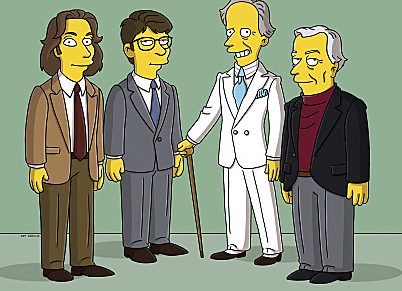Somebody Find "Red": Cam'ron and Snoop Dogg Make Song From Homeless Guy's Youtube Hit
So there’s a homeless singer and beatboxer named Red who was hanging out outside the HVW8 Art + Design Studio in L.A. a couple years ago, trying to get his music to rap producer Warren G. The HVW8 guys videotaped him doing his thing and youtubed it. (It sounds much like the beat Timbaland made for Ginuwine’s “Pony.”) A year and a half later, his performance has been watched 625,000 times-and now, rap stars Cam’ron and Snoop Dogg have made a song out of it. And everybody’s looking for Red, so he can get paid.
Understand the White House
What’s the difference between the National Economic Council and the Council of Economic Advisers? This breakdown, written by the senior White House economic advisor a few weeks ago, explains roles in and around the White House. (via)
Mr. Critic Strikes Back Against Those Snobby French Foodies

“We’ll get to your needs in a minute. Here’s what would be great from my point of view, and which would make up entirely for the time I was in the Marais with my pregnant wife and this jumped-up little terrier in a Basque restaurant sneered at us for arriving without a reservation at his entirely empty restaurant at 6 p.m. He was plenty sophisticated-European. He responded to our request for a table for two with a curt, ‘Non,’ adding that all the tables-he even swept his arm back to indicate them-were reserved. So do me a favor and take your husband to Peter Luger in Brooklyn and see how he fares with those waiters, speaking English with a French accent. Just in the interest of explaining to him how New York used to be. Hey, now: the food’s plenty authentic.”
–Sam Sifton sort of attacks a reader who wrote in asking where she should take her “sophisticated-European” French husband to eat on their visit to New York City. All in good fun, though. After grinding that small personal axe a bit, he recommends Scarpetta, Le Bernadin, Annisa and 11 Madison Park.
Lap Dancer Survey Victory For Some Wave Of Feminism
Empower us, Science! “The first academic research project into lap dancing has found that, rather than being uneducated young women who have been coerced into the industry, one in four dancers has a degree and has been attracted by the money…. The researchers found no evidence of trafficking in the industry, and concluded that career and economic choices were motivations for dancing rather than drug use or coercion.” Researchers also determined that 75% of lap dancers actually find you really attractive and funny.
How the Internet Works: Advertiser-Provided Editorial Infographics!

Sometimes you learn little things about how the Internet works and it’s like, ohhhhhh! Of course! Here is a solicitation we received, which explains how an advertiser places editorial content on blogs. So that the content links to (“is sponsored by”) what are basically spam farms. It’s fascinating as a business model! It’s very smart!
From [Redacted]
to notes@theawl.com
date Thu, Aug 26, 2010 at 8:51 PM
subject Infographic Distribution
Hello ,
I know you’re really busy, so I will try to make this quick and painless. My name is Sarah and I work with a company that creates and distributes infographics. I was wondering if you’d like to be part of our infographic distribution list. We are willing to pay you for every infographic you post.
Here are a couple examples of the work we do:
http://www.huffingtonpost.com/brian-clark-howard/the-meteoric-rise-of-crai_b_649183.html
http://www.neatorama.com/spotlight/2010/06/17/13-things-worth-knowing-about-super-mario/
We would love to provide you with content while paying you for it. Please don’t hesitate to contact me with any questions. I hope to hear from you soon!
Thanks!
[Redacted]
Oh I see! I actually do admire this, honestly. It’s providing a service. (Not one I really want, but.) Think of it like radio in the 40s! Or think of it like James Beard doing skits for advertisers on NBC during his cooking show, which is much-discussed in the August issue of Gastronomica, which you should definitely be reading!
Bush Team Still Not Sure Who's Responsible For Everything Going To Shit

“Did we head into a tough period in the last six months in office? Sure. Was it a result of policies in his administration? I think there will be serious debate about that. We’ll be debating about it a long time.”
-Former Commerce Secretary Donald Evans discusses the record of the George W. Bush administration. Bush was president for 8 years and had a rubber-stamp legislature for 6 of them, but, hell, I guess we should wait until all the facts come in to really judge. Anyway, get excited for the second week in November, because Bush is back.
Ken Mehlman: I'm a Virgin

“Ken says he had sex with no one, and told no one, because he didn’t want to tell anyone, because he was uncomfortable with that part of his life.” –Marc Ambinder.
Let Us Stab The Face Of The Future
After the crushing defeat in May’s election, Britain’s opposition party is finally making an effort to show that it is the true representative of the people: “The knives came out in the Labour leadership contest today, as contenders hit out at each other ahead of the contest’s final stage.”
We're Winning for Jesus Against Big Government and Socialist Firefighters!

All these firehouses in America are just another symptom of bloated government. Putting out fires is something Americans have been doing for themselves for centuries. And lest we forget, Jesus Christ welcomes us with fire! 2 Kings 6:17! “And Elisha prayed, and said, LORD, I pray thee, open his eyes, that he may see. And the LORD opened the eyes of the young man; and he saw: and, behold, the mountain was full of horses and chariots of fire round about Elisha”! God wants us to have fires-whole chariots of them. And God wants us to not have unions, and that is why we are getting the lazy firefighters to abandon and reduce their pensions. Why would we pay each of our lazy retired firefighters literally tens of thousands of dollars a year to do nothing when they are in their fifties? (Proverbs 19:15! “An idle soul shall suffer hunger”!) Brave Philadelphia, Baltimore and even Godless San Diego are leading the way, with their “rolling brownouts” of fire department closures. They’re teaching America to proudly fight its own fires or die trying! Next up: finishing off those controlling government street lights. And then the traffic signals! Also why isn’t the postal service free? Why do these teachers want to make so much money? WHY ARE THEY PAINTING THESE LINES ON THE ROAD THAT TELL ME WHERE TO DRIVE?
Behind the Franzenfreude
by Michelle Dean

Time’s recent declaration of the obscure and notoriously media-shy writer Jonathan Franzen as our “Great American Novelist” was met, at first anyway, with shocking equanimity, it seems to me. Sure, he has a new book, Freedom, coming out. Sure, Sam Tanenhaus declared said novel a “masterpiece of American fiction” in the New York Times, though he did so nearly a month before regular readers would be able to challenge that view. Sure, such is the confidence of Farrar, Strauss, and Giroux in this book that it is pre-selling as an ebook at the unusually-high price of $14.99. Me, I read The Corrections, enjoyed it, and promptly forgot about it. I haven’t read the new book. (It’s not out until August 31st.) But really, we’re still doing the thing where we elevate a fiction-writing white men as the Greatest Thing In American Writing Today? And not blushing a little when we do this?
A writer friend to whom I was recently talking-okay, complaining-about this, noted that probably people were just resigned to the praise he’s getting because of the inevitability of the anointment, or the fact that in many ways it had already happened. Critics have always loved Franzen’s work. (Also, this writer friend said: “Franzen’s the guy who wants it the most, isn’t he?”)
But of late I’ve had company in my objections, anyway. The novelists Jodi Picoult and Jennifer Weiner began complaining on Twitter last week that the Times only liked books by “white men from Brooklyn,” starting the hashtag on Twitter #Franzenfreude, by means of which people could recommend good and, one supposes, comparatively obscure novels by women.
Both Picoult and Weiner are the kind of writers who, to use Saul Bellow’s phrase, are free to stuff their ears with money if they don’t like what they’re hearing about their own books. And while I hadn’t time to look up every interview they’ve ever given, I have a hard time believing that in their heart of hearts, they envision themselves as even writing literary fiction, or at least that they aim their work at the same critical audience Franzen does. (Would Franzen’s website have as a title “Novels About Family, Relationships, and Love”?) So I think it’s overbroad to claim that they are themselves being treated differently solely as women, in this instance.
And yet, they do have a point. And it’s a point that brings us right up to the edge of the precipice of having to re-evaluate what it is we think is worthwhile about literature, and why it might not be what current standards say it is.
There are a number of levels on which one can analyze this problem of literary merit. Only the first and most superficial is markets. From that perspective, this entire discussion is little more than wankery. First of all, not a day goes by where we’re not being reminded by publishers that the collapse in transaction costs related to publishing writing (thanks in no small part to websites like this here fine publication) is absolutely destroying traditional publishing. Whatever the former gatekeepers to literary fame think, in short, is becoming more irrelevant by the day, because if they don’t like what you’re writing, you’re perfectly welcome to self-publish (or to work with a progressive change publisher) and potentially earn a higher income, proportionate to sales anyway, than you would have if you’d signed with a major publishing house, by cutting out the middleman.
Furthermore, as Lorin Stein notes over at Ta-Nehisi Coates’ blog, if we’re gonna get all statistical about it, women in particular consume fiction at a much higher rate than men, at least today. (I’ve got no more than anecdotal evidence to back this up but it seems, if Jane Austen was accurately reporting her era, women have been the prime consumers of novels for quite some time.) That fact is often held up to explain why writers like Picoult and Weiner are so successful, but it bears mentioning that women consume a lot of what might be called “serious fiction.”
Thus, to the extent that we’re talking about how fiction sells, the whole issue of whether book critics are biased towards white men is sort of a wash. I don’t wish to overstate that, of course. There are undoubtedly some black/female/gay/etc. literary fiction writers who have never made big sales as a result of bias. The main justification for the continuance of highbrow book reviews might indeed be their role as a marketing engine for literary fiction. But such reviews have never driven the market as a whole.
But let’s get beyond money. And also beyond the mere ego stroke of getting praise in a good review. Writing, at least of the kind you don’t bury on your hard drive, is a communicative act. It wants to be read. It is at least partially motivated by hope that your work will be grappled with by other people who take the subject as seriously as you yourself do. So when you are a lady writer, or an African American writer (sometimes you are both, whee!) and you write something, and it is met with silence by those you see yourself as writing to, or, perhaps worse, a shrug or faint praise, well, that does seem to undermine your project. It makes you feel like your voice is worth less than someone else’s. It makes you wonder if you should bother to keep speaking at all. Perhaps that cri de coeur doesn’t garner much sympathy in an age where everyone’s getting fired from soul-destroying day jobs they nonetheless desperately needed for the health insurance. But it doesn’t make it less sincerely felt.
And the silencing and devaluing of those voices has consequences, particularly when it tends to happen disproportionately to certain populations. What is praised today may very well make it into “the canon,” might very well be on some future high school syllabus, will shape somebody’s imagination, In a post I didn’t much otherwise like, because it’s appalling that in this day and age you can be engaged with the production of literary fiction and still evince innocent surprise that women are actually writing novels worth reading, Chris Jackson of Spiegel & Grau pointed readers to the Nigerian writer Chimamanda Ngozi Adichie’s speech at last fall’s TED, called “The Danger of A Single Story.”
You should watch it, she’ll put it more eloquently than I can, but one of her main points may be briefly stated as follows: when your canonical literature speaks only to one experience-the “single story”-it actually, in a very real way, begins to limit people’s imaginations, and limits the kinds of experience literature can and should expose you to. “Power is the ability not just to tell the story of another person,” she says, around the 10-minute mark, “but to make it the definitive story of that person.”
Which brings us to the question of why praise does tend to aggregate around white men, still, in a way that it doesn’t for other kinds of people. I obviously don’t think that Tanenhaus, and Michiko Kakutani (not precisely a white guy herself) sit around their little cubicles by the atrium plotting how they’re gonna keep women and people of color (and trans people!) out of the halls of literary power. As in most cases where social prejudice is really firmly entrenched, there is no Man Behind the Curtain. Otherwise, this would be a simple issue to solve: we could just fire the people in cubicles like theirs, and sexism and racism, and transmisogyny and ableism and every kind of unfairness under the sun would be over.
But life isn’t like that. Instead of men in rooms we have timeworn, and as such unquestioned, ways of thinking and evaluating.
So let’s look at the phrases that have been used to justify the effusive levels of praise being directed at Franzen. Tanenhaus, for example, says that Franzen’s book was great because it spoke to “our shared millennial life.” Grossman, the Time critic, admires the way Franzen “remains a devotee of the wide shot, the all-embracing, way-we-live-now novel.” Even the Brits agree that Franzen has tapped into some kind of shared experience psyche: the Guardian called The Corrections “a report from the frontline of American culture.”
It seems a fair question, in that context, to ask: “What’s this ‘we,’ white man?”
What collective American experience do these critics envision Franzen as describing? I have a suspicion they simply imagine their own white, male, middle class experiences as the “American experience,” because it’s always been presented that way to them, not least in the novels of Updike and Mailer and sometimes Roth that they so often list as favorites. And since Franzen does seem to have a knack for describing that particular strain of the American experience, the critics elide all the issues.¹ As an American resident for just five years, what I left there with was a profound sense that there was very little one could generally say about American culture without profoundly ignoring certain communities, without writing them right out of existence. And I lived in Brooklyn, which, it bears mentioning, is a far more diverse borough than these middle-class white narratives about it might have you believe. And I suspect there are a lot of people there, never mind in the rest of the country, who don’t relate to Franzen’s work, or Jonathan Lethem’s, or David Foster Wallace’s.
That doesn’t mean that people answering to other demographic characteristics can’t like these books. You
can relate across chasms of experience and even prejudice-no one can tell you this better than, say, a person of color who’s spent her life studying and loving E.M Forster’s work. But should she always have to? Isn’t it fair for her to ask critics to value for something that speaks more closely to her actual life?
And of course it isn’t necessary, for an individual writer trying to write one good book, to make sure that it represents, in every significant respect, every experience out there under the sun. Yes that’s demanding too much. But it might, indeed, be the task of literary fiction as a whole to continually be revising it’s standards to be sure it’s being as inclusive as it can be. In the age after we’ve realized that white men are not the end-all and be-all of humanity, it seems worth trying to build a canon that says if we are separated from one another by class and race and gender and any number of things, the very least we can do is recognize that in a literature that’s really about “what it is to be human,” every single one of those experiences must be given airtime. It’s not a request; it’s a requirement.²
This, literary fiction and its defenders do not do particularly well. These people are often fond of quoting David Foster Wallace’s affirmation that “literature makes you feel less alone.” So view it as a prescriptive and not just a descriptive statement. It has to be about making people feel less alone, not just yourself, and people, inconveniently, include women, for starters. It’d behoove literary critics to start listening to them.
¹ I’m not even sure Franzen himself is unaware of this, of course. In a famous essay in the April 1996 Harper’s-also available in How to Be Alone-he questioned the continuing role of the social novel in the age of American pluralism: “Expecting a novel to bear the weight of our whole disturbed society to help solve our contemporary problems-seems to me a peculiarly American delusion.” But he has to accept critics’ praise on those grounds now, in any event.
² It’s also probably good business.
Michelle Dean has written for Bitch and The American Prospect. She blogs at The Pursuit of Harpyness.
